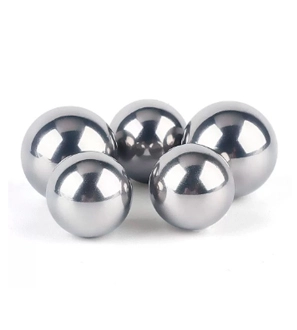Thank you for your
attention on Yesheng !
Exploring the Advantages and Development Trends of Titanium Balls
The Advantages of Titanium Balls
Exceptional Strength and Durability
Titanium balls stand out in the world of precision engineering due to their exceptional strength and durability. The inherent properties of titanium make it an ideal material for applications where components must endure high levels of stress and strain. The high tensile strength of titanium ensures that these balls can withstand demanding conditions, making them crucial in various industrial settings. Whether in ball bearings, aerospace mechanisms, or medical implants, the superior strength of titanium balls contributes to the reliability and longevity of diverse systems.
Corrosion Resistance and Biocompatibility
One of the key advantages of titanium balls lies in their resistance to corrosion. This property makes them invaluable in applications where exposure to harsh environments or corrosive substances is common. In the aerospace industry, for example, where components face extreme weather conditions, the corrosion resistance of titanium balls ensures optimal performance and safety. Additionally, in medical applications, the biocompatibility of titanium is a significant advantage. Titanium balls used in orthopedic implants and prosthetics seamlessly integrate with the human body, reducing the risk of adverse reactions and providing long-lasting solutions for improved mobility.
Lightweight Nature and High Precision
Titanium's low density, coupled with its high strength, contributes to the lightweight nature of titanium ball, This characteristic is particularly advantageous in aerospace engineering, where minimizing weight is crucial for fuel efficiency and overall performance. The lightweight yet robust nature of titanium balls also plays a vital role in precision engineering, allowing for intricate designs and high-precision applications. In fields such as robotics, where precise movements are essential, the use of titanium balls ensures accuracy and efficiency.
Development Trends of Titanium Balls
Advanced Manufacturing Techniques
The development of titanium balls is closely tied to advancements in manufacturing techniques. With the rise of additive manufacturing, commonly known as 3D printing, the production of complex geometries and customized titanium balls has become more feasible. This trend allows for greater design flexibility and opens up new possibilities for tailoring titanium balls to specific applications. As additive manufacturing technologies continue to evolve, the precision and efficiency of producing titanium balls are expected to increase, further expanding their applications.
Yeshengti offer three types of custom titanium balls


Integration in Emerging Technologies
As technology advances, titanium balls are finding new roles in emerging fields. The integration of titanium balls in nanotechnology, for instance, showcases their adaptability to cutting-edge applications. In the development of nanomachines and nano-instruments, the precision and strength of titanium balls contribute to the functionality and reliability of these miniature systems. This trend highlights the ongoing exploration of titanium balls in novel technological frontiers.
Sustainability in Material Sourcing and Recycling
A growing trend in the development of titanium balls is a focus on sustainable practices. This involves responsible sourcing of titanium ore, considering environmental and ethical factors in the extraction process. Additionally, there is an increasing emphasis on recycling titanium, aligning with broader sustainability goals. The development of closed-loop systems for titanium ball production aims to minimize waste and reduce the environmental impact, contributing to a more sustainable and eco-friendly manufacturing process.
In conclusion, the advantages of titanium balls extend from their intrinsic strength and corrosion resistance to their adaptability in emerging technologies. As development trends focus on advanced manufacturing techniques, integration in emerging fields, and sustainable practices, the future of titanium balls appears promising and dynamic. Their unique combination of properties positions titanium balls as indispensable components across industries, and ongoing innovations are set to further expand their applications in the ever-evolving landscape of precision engineering and technology.
 English
English  日本語
日本語  한국어
한국어  français
français  Deutsch
Deutsch  русский
русский 







